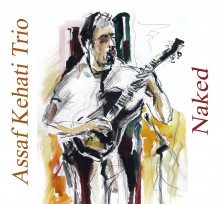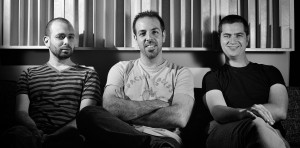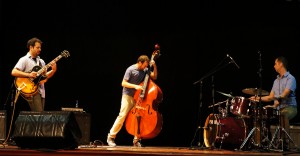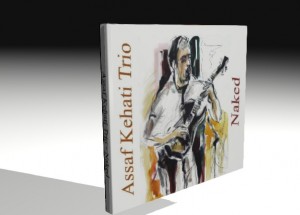
For me, the most important factor in music is the writing, I don’t care how great a musician is, if what they are playing over isn’t well written, I’m just not interested. Assaf Kehati, a new young Israel born-NYC based jazz guitarist, is never going to have to worry about that problem. Right from the moment I heard him start to play the first track “Song for Saba†off his new “Naked†CD, I could tell he was both a great guitarist and composer. Song For Saba begins with a simple, almost prayerful pastoral theme that evokes the best of Bill Frisell’s “country-jazz†ballads or Metheny’s work with Charlie Haden. An utterly sing-able and memorable melody with subtle harmonic shifts going on underneath it, Assaf and bassist Ehud Ettun work with the harmony with delicate sensitivity. Kehati is part of that new breed of jazz guitarists that know the bebop vocabulary but came up through the post-bop people and have taken all of that and put it with world music, country music, and everything else and distilled it down into a new form of jazz that is uniquely their own. He has all the chops he needs, and all the musicality to just use them to service whatever the music need.
“Long Ago And Far Away†follows that and is one of three non-originals on the record. Kehati approaches the tune with a more intervallic way of handling the changes than a chromatics around chord tones bebop treatment. His inventive arrangement gives room for both a bass solo and a drum solo from Ronen Itzik, and they show that they are well matched to Assaf in approach. The title track “Naked†is again a thoughtful opening solo guitar intro, and then gets into an expansive and evocative slow groove with cymbal washes that reminded me of Metheny and Haden’s work together. Assaf’s soloing is melodic and builds as it goes and a backbeat starts, and the tune constantly grows until it returns to state the melody again and drive out into the night to it’s ending. Kehati shows his command of harmony once again in the beautiful intro to “Beneath The Almond Treeâ€, which he says evokes the feeling of being in the Israeli desert, which he captures in a driving 6/8 groove once the body of the tune begins. Itzik takes a very tabla-esque approach to his drums here, and Ettun plays a spirited bass solo to build towards Kehati’s solo, and then they move into a double time 4/4 swing. Assaf always keeps things interesting in how he develops his themes as he solos, there is the sense of hearing someone in total control of where the music is going at all times when you hear him play.
“Someday My Prince Will Come†is the other standard on the record, and after a fresh treatment of the melody on the guitar, it goes right to a great bass solo from Ehud. Assaf’s solo is brooding and beautifully crafted, bringing Jim Hall’s best work to mind. “The Horse’s Flight†does give the image horses in the wild. Assaf gets into a “tour-de-force†solo here showing what he’s really got in term of getting loose on the harmony. He’s all over the guitar neck with a lot of wide interval playing over the fast rhumba-esque groove. He even plays some playful sort of “horse whinnies†to close the tune off. The Ornette Coleman altered blues form “When Will The Blues Leave†is a very cool Kehati arrangement of the tune. He starts with a double time swing feel and more of his very modern approach with his intervallic soloing, and then all of the sudden, gears are shifted and the band takes it to a slow blues – and then right back to the driving tempo – and back and forth for the rest of the tune – very hip. “Nathan Bo Rega†is sort of Middle Eastern groove in 7/8 that the band has a good time finding interesting ways to interplay together as a collective.  The guitar and bass improvise a groove under a drum solo, and then come back to the melody and groove it out at a medium 4/4 swing slow burn. “Outro†is just that, a way to put a period on the stories that they have been telling up until then. It’s a solo piece for Assaf that recaps his thoughtful mood in the opening song, ending with a classical type two voiced passage with him keeping a high soprano pedal note sounding with a moving melody underneath to it’s resolution.
Overall, “Naked†is a very well crafted and thematic record for Assaf Kehati Trio. I am sure that such great writing, playing, and sensitivity will bring them a wide audience all over the world.
Doug Perkins www.jazzguitarsociety.com Los Angeles, CA
Buy the album and music sheets here: https://sites.google.com/site/aknaked/
Also check out videos and more at his website: http://www.assafkehati.com/


